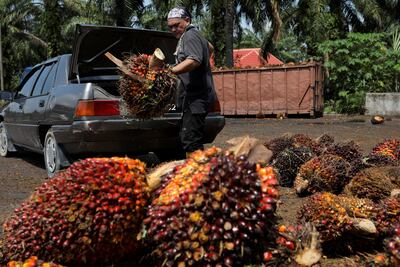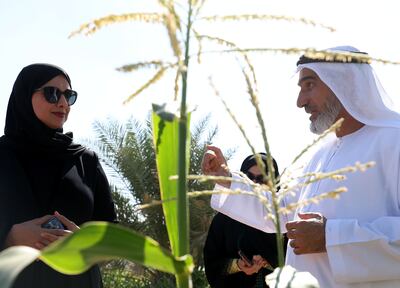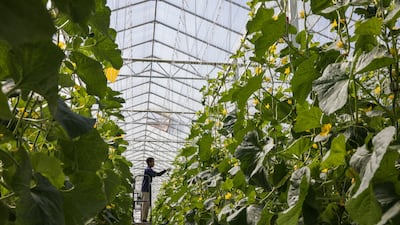As we embark on Cop29 in Baku, it is a time for reflection, but more importantly, a time for action, building on the exceptional platform created by Cop28 in the UAE.
The global food system, despite producing enough to feed everyone, is failing millions. The universal truth is that a hungry child cannot learn, a hungry adult cannot work, and a hungry society cannot thrive. Food insecurity is a silent thief, stealing potential and robbing futures. Empty stomachs breed empty dreams.
Food insecurity is a barrier to progress, trapping individuals and communities in a cycle of poverty and despair. And while progress has been made in certain regions, the number of people facing hunger remains stubbornly high, and the world is off track to meet the Sustainable Development Goal of Zero Hunger by 2030. This stark reality demands a fundamental shift in our approach to food security. We must move beyond the simplistic notion that increasing yields alone will solve the problem.
The challenges we face are complex and interconnected. Climate change, with its increasing frequency of extreme weather events, is disrupting agricultural production and threatening livelihoods. Conflicts and economic downturns further exacerbate food insecurity, pushing vulnerable populations into a vicious cycle of poverty and hunger. A world where millions go hungry is a world out of balance.
Simply producing more food within this volatile context is not enough. We need to build food systems that are resilient, sustainable and equitable, ensuring that everyone has access to safe, nutritious and affordable food, regardless of where they live.
The fight against hunger is not a spectator sport. We all have a role to play, from supporting sustainable agriculture to reducing food waste in our own homes
This requires a paradigm shift, moving away from a narrow focus on production towards a holistic approach that encompasses the entire food system, from farm to fork.
We need to invest in climate-smart agriculture, promoting practices that conserve resources, adapt to changing conditions and mitigate greenhouse gas emissions. We must strengthen local food systems, empowering smallholder farmers, particularly women, who play a vital role in food production and rural economies.
Reducing food loss and waste throughout the supply chain is equally crucial. Currently, one-third of all food produced is lost or wasted, representing a colossal waste of resources and a missed opportunity to feed millions. Investing in better storage, transport and processing infrastructure, as well as promoting responsible consumption patterns, can significantly reduce this waste and enhance food security.
Further, we need to prioritise the production and consumption of nutritious foods. While global food production has increased, the affordability of healthy diets remains a challenge for billions. Unhealthy food environments, characterised by the abundance of processed foods high in fats, sugars and salt, are contributing to a global rise in obesity and diet-related diseases.
We must create food environments that encourage the consumption of fruits, vegetables, legumes and other nutrient-rich foods, making healthy diets accessible and affordable for all.
But let me be clear: the fight against hunger is not a spectator sport. We all have a role to play, from supporting sustainable agriculture to reducing food waste in our own homes.
In fact, the UAE, guided by its commitment to sustainable development, is actively pursuing a holistic approach to food security. We are investing in cutting-edge agricultural technologies, promoting sustainable farming practices, working with our farmers and fisherfolk at a hyper-local level to support them, and strengthening international partnerships such as “Aim for Climate” to address global food challenges.
We are also working to enhance food trade and logistics, ensuring the efficient flow of food from surplus to deficit regions. Recently we launched our “Plant the Emirates” National Programme, aimed at bringing together business, communities and individuals to find new ways to address our biggest agricultural challenges, boost domestic production, upskill farmers and finance agricultural projects through a new National Agricultural Centre.
With Cop29 around the corner, let us recognise that food security is not just about producing more, but about producing better, distributing more equitably and consuming more responsibly. It is about building resilient food systems that can withstand shocks, nourish populations and contribute to a sustainable future for all.
How we achieve that is by acting in unison, because the truth is that the challenges of food insecurity are too great for any one nation or organisation to solve alone. We need to forge partnerships, share knowledge and work together to create lasting solutions. It requires a world where every nation contributes its strengths, every organisation lends its expertise, and every individual plays their part. That’s the power of collective action, and that’s how we will conquer hunger.
The UAE stands ready to collaborate with partners around the world to achieve this shared vision, and I know that each of the 160 nations that have now signed the UAE Cop28 Declaration on Resilient Food Systems, Sustainable Agriculture and Climate Action are equally committed to creating a global food system that feeds, rather than fails.
The five pillars of Islam
UAE currency: the story behind the money in your pockets
Engine: 3.5-litre V6
Transmission: eight-speed automatic
Power: 290hp
Torque: 340Nm
Price: Dh155,800
On sale: now
UAE currency: the story behind the money in your pockets
UAE currency: the story behind the money in your pockets
COMPANY PROFILE
● Company: Bidzi
● Started: 2024
● Founders: Akshay Dosaj and Asif Rashid
● Based: Dubai, UAE
● Industry: M&A
● Funding size: Bootstrapped
● No of employees: Nine
The bio
Favourite food: Japanese
Favourite car: Lamborghini
Favourite hobby: Football
Favourite quote: If your dreams don’t scare you, they are not big enough
Favourite country: UAE
Ticket prices
- Golden circle - Dh995
- Floor Standing - Dh495
- Lower Bowl Platinum - Dh95
- Lower Bowl premium - Dh795
- Lower Bowl Plus - Dh695
- Lower Bowl Standard- Dh595
- Upper Bowl Premium - Dh395
- Upper Bowl standard - Dh295
Mobile phone packages comparison
Muslim Council of Elders condemns terrorism on religious sites
The Muslim Council of Elders has strongly condemned the criminal attacks on religious sites in Britain.
It firmly rejected “acts of terrorism, which constitute a flagrant violation of the sanctity of houses of worship”.
“Attacking places of worship is a form of terrorism and extremism that threatens peace and stability within societies,” it said.
The council also warned against the rise of hate speech, racism, extremism and Islamophobia. It urged the international community to join efforts to promote tolerance and peaceful coexistence.
More from Neighbourhood Watch:
Yemen's Bahais and the charges they often face
The Baha'i faith was made known in Yemen in the 19th century, first introduced by an Iranian man named Ali Muhammad Al Shirazi, considered the Herald of the Baha'i faith in 1844.
The Baha'i faith has had a growing number of followers in recent years despite persecution in Yemen and Iran.
Today, some 2,000 Baha'is reside in Yemen, according to Insaf.
"The 24 defendants represented by the House of Justice, which has intelligence outfits from the uS and the UK working to carry out an espionage scheme in Yemen under the guise of religion.. aimed to impant and found the Bahai sect on Yemeni soil by bringing foreign Bahais from abroad and homing them in Yemen," the charge sheet said.
Baha'Ullah, the founder of the Bahai faith, was exiled by the Ottoman Empire in 1868 from Iran to what is now Israel. Now, the Bahai faith's highest governing body, known as the Universal House of Justice, is based in the Israeli city of Haifa, which the Bahais turn towards during prayer.
The Houthis cite this as collective "evidence" of Bahai "links" to Israel - which the Houthis consider their enemy.
Business Insights
- Canada and Mexico are significant energy suppliers to the US, providing the majority of oil and natural gas imports
- The introduction of tariffs could hinder the US's clean energy initiatives by raising input costs for materials like nickel
- US domestic suppliers might benefit from higher prices, but overall oil consumption is expected to decrease due to elevated costs
French business
France has organised a delegation of leading businesses to travel to Syria. The group was led by French shipping giant CMA CGM, which struck a 30-year contract in May with the Syrian government to develop and run Latakia port. Also present were water and waste management company Suez, defence multinational Thales, and Ellipse Group, which is currently looking into rehabilitating Syrian hospitals.
Honeymoonish
%3Cp%3E%3Cstrong%3EDirector%3A%3C%2Fstrong%3E%20Elie%20El%20Samaan%3C%2Fp%3E%0A%3Cp%3E%3Cstrong%3EStarring%3A%20%3C%2Fstrong%3ENour%20Al%20Ghandour%2C%20Mahmoud%20Boushahri%3C%2Fp%3E%0A%3Cp%3E%3Cstrong%3ERating%3A%3C%2Fstrong%3E%203%2F5%3C%2Fp%3E%0A
Why seagrass matters
- Carbon sink: Seagrass sequesters carbon up to 35X faster than tropical rainforests
- Marine nursery: Crucial habitat for juvenile fish, crustations, and invertebrates
- Biodiversity: Support species like sea turtles, dugongs, and seabirds
- Coastal protection: Reduce erosion and improve water quality
The past Palme d'Or winners
2018 Shoplifters, Hirokazu Kore-eda
2017 The Square, Ruben Ostlund
2016 I, Daniel Blake, Ken Loach
2015 Dheepan, Jacques Audiard
2014 Winter Sleep (Kış Uykusu), Nuri Bilge Ceylan
2013 Blue is the Warmest Colour (La Vie d'Adèle: Chapitres 1 et 2), Abdellatif Kechiche, Adele Exarchopoulos and Lea Seydoux
2012 Amour, Michael Haneke
2011 The Tree of Life, Terrence Malick
2010 Uncle Boonmee Who Can Recall His Past Lives (Lung Bunmi Raluek Chat), Apichatpong Weerasethakul
2009 The White Ribbon (Eine deutsche Kindergeschichte), Michael Haneke
2008 The Class (Entre les murs), Laurent Cantet
Milestones on the road to union
1970
October 26: Bahrain withdraws from a proposal to create a federation of nine with the seven Trucial States and Qatar.
December: Ahmed Al Suwaidi visits New York to discuss potential UN membership.
1971
March 1: Alex Douglas Hume, Conservative foreign secretary confirms that Britain will leave the Gulf and “strongly supports” the creation of a Union of Arab Emirates.
July 12: Historic meeting at which Sheikh Zayed and Sheikh Rashid make a binding agreement to create what will become the UAE.
July 18: It is announced that the UAE will be formed from six emirates, with a proposed constitution signed. RAK is not yet part of the agreement.
August 6: The fifth anniversary of Sheikh Zayed becoming Ruler of Abu Dhabi, with official celebrations deferred until later in the year.
August 15: Bahrain becomes independent.
September 3: Qatar becomes independent.
November 23-25: Meeting with Sheikh Zayed and Sheikh Rashid and senior British officials to fix December 2 as date of creation of the UAE.
November 29: At 5.30pm Iranian forces seize the Greater and Lesser Tunbs by force.
November 30: Despite a power sharing agreement, Tehran takes full control of Abu Musa.
November 31: UK officials visit all six participating Emirates to formally end the Trucial States treaties
December 2: 11am, Dubai. New Supreme Council formally elects Sheikh Zayed as President. Treaty of Friendship signed with the UK. 11.30am. Flag raising ceremony at Union House and Al Manhal Palace in Abu Dhabi witnessed by Sheikh Khalifa, then Crown Prince of Abu Dhabi.
December 6: Arab League formally admits the UAE. The first British Ambassador presents his credentials to Sheikh Zayed.
December 9: UAE joins the United Nations.
All about the Sevens
Cape Town Sevens on Saturday and Sunday: Pools A – South Africa, Kenya, France, Russia; B – New Zealand, Australia, Spain, United States; C – England, Scotland, Argentina, Uganda; D – Fiji, Samoa, Canada, Wales
HSBC World Sevens Series standing after first leg in Dubai 1 South Africa; 2 New Zealand; 3 England; 4 Fiji; 5 Australia; 6 Samoa; 7 Kenya; 8 Scotland; 9 France; 10 Spain; 11 Argentina; 12 Canada; 13 Wales; 14 Uganda; 15 United States; 16 Russia
UAE currency: the story behind the money in your pockets
Central%20Bank's%20push%20for%20a%20robust%20financial%20infrastructure
%3Cul%3E%0A%3Cli%3ECBDC%20real-value%20pilot%20held%20with%20three%20partner%20institutions%26nbsp%3B%3C%2Fli%3E%0A%3Cli%3EPreparing%20buy%20now%2C%20pay%20later%20regulations%26nbsp%3B%3C%2Fli%3E%0A%3Cli%3EPreparing%20for%20the%202023%20launch%20of%20the%20domestic%20card%20initiative%26nbsp%3B%3C%2Fli%3E%0A%3Cli%3EPhase%20one%20of%20the%20Financial%20Infrastructure%20Transformation%20(FiT)%20completed%3C%2Fli%3E%0A%3C%2Ful%3E%0A
More from Neighbourhood Watch
How to volunteer
The UAE volunteers campaign can be reached at www.volunteers.ae , or by calling 800-VOLAE (80086523), or emailing info@volunteers.ae.
Top%2010%20most%20competitive%20economies
%3Cp%3E1.%20Singapore%0D%3Cbr%3E2.%20Switzerland%0D%3Cbr%3E3.%20Denmark%0D%3Cbr%3E4.%20Ireland%0D%3Cbr%3E5.%20Hong%20Kong%0D%3Cbr%3E6.%20Sweden%0D%3Cbr%3E7.%20UAE%0D%3Cbr%3E8.%20Taiwan%0D%3Cbr%3E9.%20Netherlands%0D%3Cbr%3E10.%20Norway%0D%3Cbr%3E%3C%2Fp%3E%0A
The specs
Engine: 4.0-litre V8 twin-turbocharged and three electric motors
Power: Combined output 920hp
Torque: 730Nm at 4,000-7,000rpm
Transmission: 8-speed dual-clutch automatic
Fuel consumption: 11.2L/100km
On sale: Now, deliveries expected later in 2025
Price: expected to start at Dh1,432,000
The%20specs
%3Cp%3E%3Cstrong%3EPowertrain%3A%20%3C%2Fstrong%3ESingle%20electric%20motor%0D%3Cbr%3E%3Cstrong%3EPower%3A%20%3C%2Fstrong%3E201hp%0D%3Cbr%3E%3Cstrong%3ETorque%3A%20%3C%2Fstrong%3E310Nm%0D%3Cbr%3E%3Cstrong%3ETransmission%3A%20%3C%2Fstrong%3ESingle-speed%20auto%0D%3Cbr%3E%3Cstrong%3EBattery%3A%20%3C%2Fstrong%3E53kWh%20lithium-ion%20battery%20pack%20(GS%20base%20model)%3B%2070kWh%20battery%20pack%20(GF)%0D%3Cbr%3E%3Cstrong%3ETouring%20range%3A%20%3C%2Fstrong%3E350km%20(GS)%3B%20480km%20(GF)%0D%3Cbr%3E%3Cstrong%3EPrice%3A%20%3C%2Fstrong%3EFrom%20Dh129%2C900%20(GS)%3B%20Dh149%2C000%20(GF)%0D%3Cbr%3E%3Cstrong%3EOn%20sale%3A%3C%2Fstrong%3E%20Now%3C%2Fp%3E%0A




